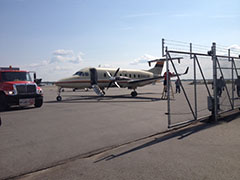August 17, 2015
The Last Frontier calls for help, Kansas answers
Submitted by Jennifer Williams

Usually, it's tourists from the lower 48 who descend upon Alaska in the summer months. This summer, as Alaska was on pace to set a new record for the number of acres burned by wildfires, the ones flocking to the land of the midnight sun have been firefighters and firefighting personnel. Forty-five states, including Washington, D.C., sent more than 3,500 firefighting personnel to battle multiple, ongoing fires in the state this season. This number includes many varied support personnel, and one such member was the Kansas Forest Service's very own fire management coordinator, Ross Hauck.
Hauck has 35 years of fire service, and celebrates his 13th anniversary with the Kansas Forest Service this month. For nearly three weeks, Hauck was deployed to Alaska and skillfully performed the role of equipment manager in the Northern Region Operation out of Fairbanks.
"This assignment wasn't a typical ground support job as equipment manager," said Russ Smith, Ground Support Unit Leader, Alaska Forest Service. "This was a difficult assignment; Ross had to make decisions in chaotic situations, his instincts were good. He had to adjust to constantly changing time frames and confusion. He was methodical and did not get flustered, which helped keep everything running smoothly."
As Hauck explains it, the environment in Alaska demands a different approach to suppression than anywhere else in the lower 48. The fire-prone areas of the region have year-round permafrost. Once the fire burns off the insulating moss, and the sun is able to thaw the ground, the area turns into a swamp. Thus, fire engines and heavy equipment is of little value to the firefighting personnel, and handcrews, or "boots on the ground" firefighting teams become the standard.
"As an equipment manager, coordination of personnel movement is not a duty normally encountered in other states," said Hauck, who is fire management coordinator, Kansas Forest Service. "Usually, an equipment manager would be providing the trucks and buses, and the Operations section would deploy them when and where crews are needed."
In Alaska, Hauck had the responsibility of organizing all of the above.
"While this deployment was very unique and presented its challenges, I felt it was very rewarding and would accept a similar assignment in the future," Hauck said. "Having been in the fire service for 35 years, I see the importance of being a part of the Logistical section. Supporting the front-line firefighter with equipment, food, and all matter of supplies that are required to stay healthy and productive for two weeks of long hours and hard work, then returning them home to family and friends, ready to go to another incident after a few days of rest, is as important as being one of the 'boots on the ground.'"
